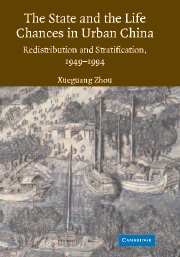Book contents
- Frontmatter
- Contents
- List of Figures
- List of Tables
- Preface
- Credit Line
- 1 Redistribution and Stratification Dynamics Under State Socialism
- 2 Overview: Historical Context and Research Design
- PART ONE REDISTRIBUTION AND STRATIFICATION DYNAMICS: EMPIRICAL EVIDENCE
- PART TWO ASSESSING INSTITUTIONAL CHANGES IN THE POST-MAO ERA
- PART THREE SUMMARY AND CONCLUSION
- 11 Social Stratification Under State Socialism: Summary and Assessment
- 12 Stratification Dynamics and Institutional Transformation
- References
- Index
12 - Stratification Dynamics and Institutional Transformation
Published online by Cambridge University Press: 28 October 2009
- Frontmatter
- Contents
- List of Figures
- List of Tables
- Preface
- Credit Line
- 1 Redistribution and Stratification Dynamics Under State Socialism
- 2 Overview: Historical Context and Research Design
- PART ONE REDISTRIBUTION AND STRATIFICATION DYNAMICS: EMPIRICAL EVIDENCE
- PART TWO ASSESSING INSTITUTIONAL CHANGES IN THE POST-MAO ERA
- PART THREE SUMMARY AND CONCLUSION
- 11 Social Stratification Under State Socialism: Summary and Assessment
- 12 Stratification Dynamics and Institutional Transformation
- References
- Index
Summary
Bad fortune will promote the good;
good fortunate, too, gives rise to the bad.
Lao ZiIn this book, we have examined the forty-five-year history of redistribution and social stratification processes in the People's Republic of China, from 1949 to 1994. We have emphasized the profound impacts of the state and state policies on individual life chances, especially in the form of stratification dynamics. In this concluding chapter, we hope to accomplish two goals. We first consider the implications of stratification dynamics for the crisis of state socialism and for the societal basis of institutional transformation in the Chinese context. On this basis, our second task is to discuss the issues related to the second theme of this book – sources and directions of China's institutional transformation in the post-Mao era. We conclude this chapter and this book with some reflections on the implications of the Chinese experience for understanding social stratification and institutional changes in a comparative perspective.
RETHINKING STATE–SOCIETY RELATIONSHIP UNDER STATE SOCIALISM
The demise of state socialism is one of the major historical events of the twentieth century. Interestingly, few social science theories have anticipated either the large-scale social protests in the late 1980s or the sudden collapse of the state socialist regimes in the USSR and Eastern Europe. With much hindsight, we can say that an important, missing piece to this puzzle is the role of society in state socialist countries.
- Type
- Chapter
- Information
- The State and Life Chances in Urban ChinaRedistribution and Stratification, 1949–1994, pp. 317 - 336Publisher: Cambridge University PressPrint publication year: 2004

